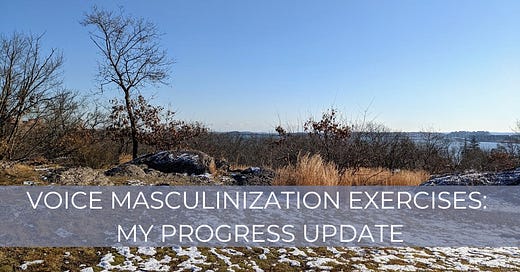Voices (and voice masculinization exercises) are really challenging! My partner asked me, "If you want to, why don't you just speak in a lower voice?" It does seem like it should be straightforward, when you put it that way. A couple of things: lowness (or pitch) of the voice is not the most gendered characteristic. Resonance (a booming or deep sound or lack therof) is what most people notice about voices. Also, when you've been learning speech patterns since you were a small child, thirty years later, these patterns of moving your throat get very ingrained!
If you don't know me or haven't heard me speak, I am a nonbinary person not on testosterone. I wouldn't necessarily call myself pre-T, because, I don't know yet if I will or will not ever take T! In this post I'll talk about my experience with voice masculinization exercises.
Voice masculinization exercises to break habits
Everything I know about trans voice work, I have learned from Renée Yoxon. Their online course Trans Vocal Exploration has been incredibly helpful for me as I learn to understand and modify my voice. Check out Renée's excellent interview on the Gender Reveal podcast!
Voice exercises are ways to practice speaking words and sounds in a way you wouldn't normally. Practicing single sounds, words, or phrases outside of a social situation or conversation is a lower pressure way to experiment with a different way to vocalize. Exercises can help modify the pitch (how high or low), resonance (how deep or open), and other characteristics of voice.
I find it is relatively easy for me to make different kinds of sounds when I am doing exercises, and hard for me to incorporate those changes into my everyday speech.
Why is it so hard for me to change how I speak?
Some people may speak without thinking about it much. Not me, haha. I often have several layers going on when I speak, especially to a stranger. For example, if I need to ask the librarian for a new library card:
I formulate the words for what I want "a library card"
I add a polite wrapper of words: "excuse me, can you help me get a new library card?"
I wait for a good time to speak (when the librarian is done helping the previous person)
I smile and step to the right place
I make my voice an appropriate volume to be heard but not be yelling (especially, through a face mask)
I speak the question and pitch my voice up at the end to make it clear it is a question
And yes, I think about all of these things. So to make my voice more masculine at the same time as all of the above, I'm adding the following:
Start my question at a lower pitch than I am used to
Don't go up in pitch very much, instead get slightly louder at the end of the question for masculine emphasis
Worry that if I speak this way it will sound rude or demanding
Have trouble with the volume of my words at a pitch I'm less used to
Open my throat and chest for a more resonant sound (difficult if I'm tense)
Deal with a 10% chance of my pitch going all over the place and squeaking in an embarrassing way when my throat tenses up from nervousness
When I first changed my name, I had so much trouble calling myself by the correct new name. I had habits. It felt embarrassing to use a different name. I have similar feelings about using a new style of voice. It's not me yet. Not that I like my old voice particularly, but any new voice feels like I'm doing something weird and takes a lot of focus.
What am I aiming for with voice masculinization exercises (without T)?
This is such a difficult question for me. I don't have a "target voice." I appreciate lower voices that some cis women have, but I don't read those voices as masculine. I'm looking to eliminate some of the higher, fluttery, squeaky traits from my voice. But the problem with working with a negative like that, is I don't have a clear goal.
I feel like if I was on T, I'd have a much better idea of other trans people I'd like to sound like. My voice is not going to sound like that through exercises alone. T thickens the vocal cords, a physical change.
I also don't want my voice to sound "unnatural" or forced.
My best explanation of what I would like is a lower voice (but not too low) with more resonance and masculine features, but not so much that the voice would be out of place for a cis woman.
My voice on video
I film myself talking a lot these days. Listening to my own voice can be uncomfortable. My coping mechanism is really simple: I don't listen to myself when I'm editing the video! I use CapCut, a free app, to edit all my videos. I load the video clip into CapCut, then I select Auto-Captions. The app generates text captions which I then use to edit the clip, along with lip reading to see when I finish saying a sentence, for example.
I don't want to limit my ability to share my words online, just because I don't love hearing my own recorded voice. I am also working on my voice: before I film a video I practice a few pitch and resonance exercises to get my body warmed up for speaking in the way I would like.
It's been an interesting journey working on my voice. I don't feel I've changed it significantly yet but I have learned a great deal about how voices work and about myself!
If you want to read more about trans and nonbinary voices, please check out:





